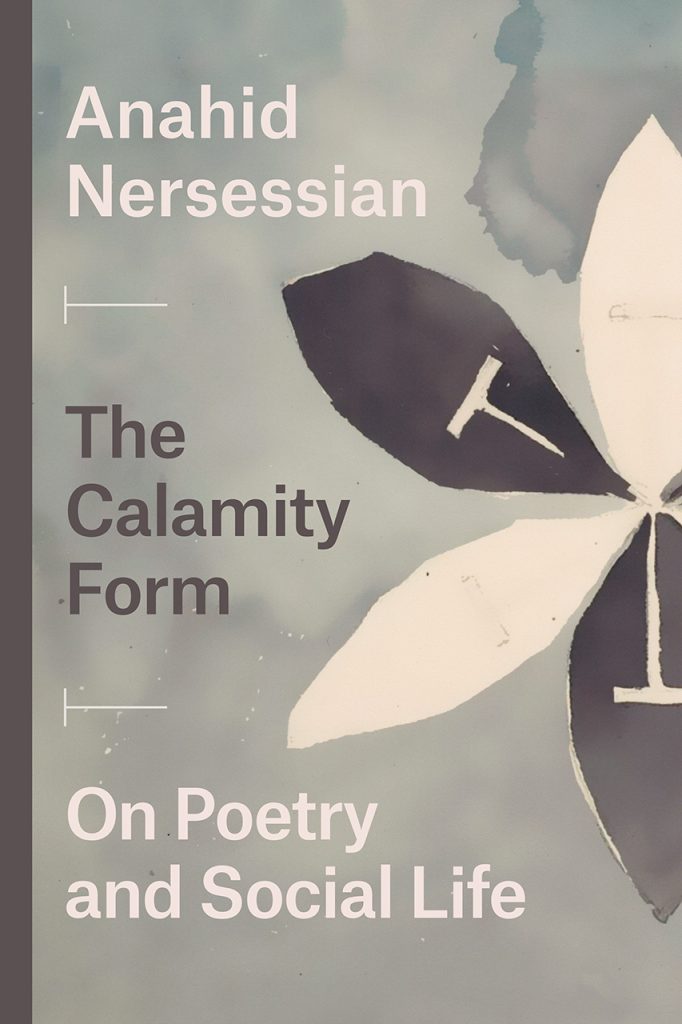Anahid Nersessian on Wordsworth: An Excerpt from “The Calamity Form”
Today, on William Wordsworth’s 250th birthday, the poet will come in for his share of adoration. We offer a dissent from a critic who is nevertheless a passionate reader of Romantic poetry. In this excerpt from her forthcoming book The Calamity Form: On Poetry and Social Life, Anahid Nersessian asks why Wordsworth’s poetry leaves her cold. It’s not his politics or his narcissism, she writes, or anything else she cares to critique, but an “estrangement that cuts both ways. Why should Wordsworth fail me, and I him?” Read on, and look for The Calamity Form in June.
Let me put it bluntly: I don’t like Wordsworth. I almost said I don’t care for him, but that’s not quite true. A day spent writing about Wordsworth is a good day; when he comes into the classroom with me, things inevitably go well. And yet the eye I cast on his section of my bookshelf is doubtful, disgruntled. Never could I imagine reading Wordsworth for pleasure, though it is with pleasure that I recall someone’s startled love for that cataract in the seventy-seventh line of “Tintern Abbey.” It is with pleasure, too, that I’ve been taught about Wordsworth by professors and colleagues, by lectures and book chapters, and by the poems of others, especially those that share or repeat the “traumatological structure” of The Prelude, playing back some jackknife dive into “a chasm that is like a chiasmus in the way it both narrows and opens up.” But Wordsworth himself leaves me cold.
By cold I mean unmoved and unmoving, for it has long been my view that there is something insurmountable about Wordsworth, that the poetry is structured by a subterranean series of blockages that keep me from being involved in it, cajoled by any combination of affective, aesthetic, and intellectual prompts. The poet Nan Shepherd wrote of “a traffic of love” between herself and Scotland’s Cairngorms mountain range; in his own immixture of nature-writing and amour propre, Wordsworth taps the fullness of that same thought to turn congestion into a form of intimacy, obstacles into channels of care. I see that and yet, for me, these each feel uniquely impassive.
It’s not like Wordsworth is a rebarbative poet; it’s not like he pleads for a sympathy I might be compelled to withhold. So many of his experiences are familiar: disappointment and self-rebuke, the passion and fear of wildness—these are common enough, and I’ve known them too. Nor can I say, as others have, that my alienation from Wordsworth is political: I don’t mind the sexism or the glacial sexuality, the turn against revolution and even reform. I don’t mind the narcissism or the way it occasionally unfurled into full-blown nastiness (“A very pretty piece of paganism”), and like Hazlitt I’m unfazed by “the hebetude of [Wordsworth’s] intellect and the meanness of his subject,” happy to accept both as the calling cards of avant-garde innovation.
In short, this isn’t about critique; it’s about a numbness that jump-starts irritation, an estrangement that cuts both ways. Why should Wordsworth fail me, and I him?
Recently it was suggested to me that I don’t understand Wordsworth because I’m not English. This can’t be true: I often think the only thing I understand is English poetry. Besides, why attribute to an accident of biography what might well be a matter of poetics? I’d rather not believe my resistance is meaningless or flatly identitarian, so this chapter is an effort to follow detachment into some better insight. Of course, whether I like Wordsworth or not is not anything to keep anyone up at night. What could, though, is how the poetic mode he develops—sober, a bit sodden, and yet tremoring with the concentrated force of momentum bound by meter—might produce a certain unintelligibility or intransigence, a poem facing us from behind a wall. Facing or, perhaps, fronting, as in the opening lines of “Michael”:
If from the
public way you turn your steps
Up the tumultuous brook of Green-head Gill,
You will suppose that with an upright path
Your feet must struggle; in such bold ascent
The pastoral mountains front you, face to face.
But, courage! for beside that boisterous Brook
The mountains have all open’d out themselves,
And made a hidden valley of their own.
“Front” names the appearance of candor as concealment, for behind the prosopopoeia of the mountains’ hard face lies a secret from which our attention is about to be redirected. The poem, after all, concerns neither the hidden valley nor any of the trail markers Wordsworth clusters around it but the shepherd Michael’s unfinished sheepfold. It is to this ruin that Wordsworth’s “story appertains,” a curious verb that suggests a doubled or extraemphatic relevance, the story molded against its object like wax or gum (“M,” 18).
The mountains turn out to be, in the colloquial sense, a front, a pretense, introducing the main line of “Michael” while continuing to keep their own counsel. They draw attention to deflect it and this might be said, too, of Wordsworth’s poems: that they give off light without heat, face us without feeling, are opened out on a secret they’re never going to divulge. As this passage suggests, it may well be that what the mountains hide is, simply, themselves, as if secrecy were their substance and to betray it would be killing.
“He has written to disclose a buried life,” says David Bromwich, but “he does not pretend to know the meaning of those days.” If this chapter is about incomprehension, it is also a chapter about secrets, the ones we keep even from ourselves. These are taken or, more properly, used as a structure that solicits nescience in various guises—as attention, as annoyance, as paralysis, as compliance or willingness but never, pointedly, as the response to a seduction, because it is never the aim of Wordsworth’s poetry to charm or entrap. My word for both this reticence and this bewilderment is obscurity, a poetic trope that has played a decisive role in the development of hermeneutics and, by extension, literary criticism.

Anahid Nersessian is associate professor of English at the University of California, Los Angeles. She is the author of Utopia, Limited: Romanticism and Adjustment, and the coeditor of the Thinking Literature series, published by the University of Chicago Press.
The Calamity Form publishes in June and is available now for pre-order from our website and your local bookseller.
